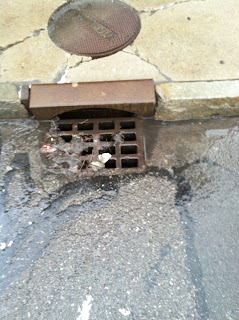I took the same walk through the quad as usual. Besides the deposits of rock salt left on the stairs, in the cracks in the pavement, and inside door frames- the only unusual part of Wednesday, March 27th was the abrupt snow storm that took place on my drive home from Buffalo to Rochester. I suppose the sporadic weather of Buffalo, NY should not be of much surprise to me as the left over rock salt has become a contemporary norm to Upstate New York. I think what you observe on your daily commute to either a job, school, home, or errands all depends on your "usual" exposure and we typically only observe something that is not a part of this "usual."
I am sure if my relatives from Atlanta, Georgia came to the quad, they would react much differently to the blue slushie-looking substance on the walkway than my immediate family as they have lived in Rochester for 20+ years and see salt residue on a normal basis.
The quad appears to be "usual" today as it has been mostly barren like this ever since I started documenting my visits to this spot back in January. However, like all my prior posts on this blog have suggested, just because something occurs regularly, what I refer to as the "usual," should we accept that as being necessarily good? Just because it is normal for nearly 36,000 Americans to die from the flu every year, the "usual" number of deaths according to CNN Health, I do not believe this average is good. And when I refer to good- is it safe to equate good, when referring to the environment and its inhabitants, as being healthy? There is a use for rock salt, just like there is a use for vaccinations. Rock salt can prevent people and cars from slipping and therefore prevent deaths in the same way vaccines can prevent contracting deadly diseases. But just as you may not necessarily slip if there is no salt sprinkled on sidewalks or how you may never end up getting the flu regardless of being vaccinated, the question that needs to be addressed is unlike vaccines, does adding rock salt to the ground and roads do more harm than good- especially when we take a look at what it does to plant life and the local ecosystem? It destroys and kills the surrounding grass, stunts plant growth, is consumed by small rodents, can be tracked inside our homes, and can irritate the paw beds of our pets. These cons need to be taken into consideration seriously when determining if rock salt does more harm than good and whether we should have the choice, just like we have the choice to be vaccinated, if salt should be sprinkled in our community at Canisius College.













